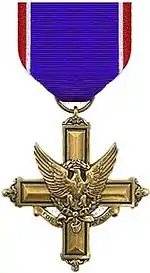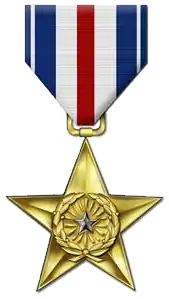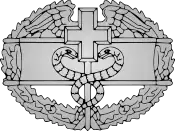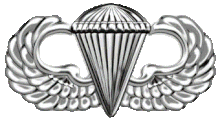Charles L. Kelly
Charles Livingston Kelly was a United States Army helicopter pilot during The Vietnam War.
Early life and career
Born April 10, 1925 in Wadley, Georgia, Major Kelly was the Commanding Officer of the 57th Medical Detachment (Helicopter Ambulance) from 11 January 1964 until he was killed in action on 1 July of the same year while trying to evacuate a wounded American advisor along with several ARVN wounded.
Kelly was called "Crazy Kelly" and "Mad Man" for his willingness to fly into danger to rescue the wounded. Kelly often flew missions at night, claiming that all the times he had been hit had been during daylight.
1 July 1964
Kelly was killed in action on July 1, 1964, when, after being warned out of a "Hot" landing zone, he replied, "When I have your wounded." A bullet entered through an open cargo door and pierced his heart. Major Kelly became the 149th American to die in Vietnam. The following day, an officer tossed the bullet on his desk in front of Kelly's successor, Captain Patrick Henry Brady and asked if they were going to stop flying so aggressively. Brady picked up the bullet and replied, "we are going to keep flying exactly the way Kelly taught us to fly, without hesitation, anytime, anywhere."[1]Kelly is buried in Georgia[2]
Awards, Decorations and Honors
Distinguished Service Cross

Citation:
The President of the United States of America, authorized by Act of Congress, July 9, 1918 (amended by act of July 25, 1963), takes pride in presenting the Distinguished Service Cross (Posthumously) to Major (Medical Corps) Charles L. Kelly (ASN: 0-70399), United States Army, for extraordinary heroism in connection with military operations involving conflict with an armed hostile force in the Republic of Vietnam, while serving as an Aircraft Commander of the 57th Medical Detachment, on 1 July 1964. Major Kelly demonstrated exceptional courage, strong determination, and complete disregard for his own personal safety while participating in an aerial medical mission to evacuate wounded soldiers from an area under heavy attack by hostile forces. With unique professional skill and full knowledge of the intense ground fire and the immediate proximity of the enemy, he landed the unarmed helicopter ambulance close to the wounded men in the exposed area. Although the ground advisor warned him of the grave danger and recommended departure, Major Kelly refused to leave without the wounded soldiers and succeeded in loading them aboard the helicopter moments before he was mortally wounded by hostile gun fire. Major Kelly's extraordinary heroic actions, valiant efforts, and deep concern for his fellow man are in the highest traditions of the United States Army and reflect great credit upon himself and the United States Army Medical Service, and the armed forces of his country.[3]
Silver Star Citation

Citation:
The President of the United States of America, authorized by Act of Congress July 9, 1918 (amended by an act of July 25, 1963), takes pride in presenting the Silver Star (Posthumously) to Major (Medical Corps) Charles L. Kelly (ASN: 0-70399), United States Army, for gallantry in action in connection with military operations involving conflict with an armed hostile force in the Republic of Vietnam, while serving as an Aircraft Commander of the 57th Medical Detachment, on 19 June 1964. Major Kelly displayed professional skill, fortitude, and determination while participating in an aerial medical mission to evacuate several critically wounded Vietnamese troops. Although his first attempt to land the helicopter ambulance was prevented by intense enemy action, he returned within the hour and succeeded in maneuvering the aircraft into the area. As the small arms, automatic weapons fire, and mortar rounds fell near the aircraft, he exposed himself to the danger while assisting the wounded men on board the helicopter ambulance. When a round of ammunition hit the main fuel drain valve of the aircraft during the evacuation operations, he quickly assessed the situation and, through his decision that the patients on board be flown out immediately for medical treatment, the helicopter landed at a medical facility with a few minutes of fuel to spare. Through his courageous and unselfish actions the wounded men received timely medical aid and many lives were saved. Major Kelly's conspicuous gallantry is in the highest traditions of the United States Army and reflects great credit upon himself and the military service.[4]
Commendations
MAJ Kelly has been awarded the following:
Fort Rucker's Kelly Hall, in which Army Air Traffic Controllers were trained in the 1980s, is named in his honor.
Documentary Film Tribute
In 2002, the documentary film crew of In the Shadow of the Blade honored Kelly's story at their landing zone near Columbus, Georgia. After hearing the story of his father's courage from Vietnam Dustoff colleague Ernest Sylvester, Charles Kelly, Jr. flew in the left seat of the documentary's restored UH-1 Iroquois, emulating his father's wartime experience.
Notes
- Dorland, Peter; Nanney, James (1982). Dust Off: Army Aeromedical Evacuation in Vietnam. Washington, D.C.: Center of Military History - United States Army.
- Lucas, Jim G. (April 22, 1964). "Night 'Copter Missions routine for 'Mad Man.'". El Paso Herald-Post.
Plaque and display at the Army Aviation Museum at Ft Rucker AL
References
- "WHEN I HAVE YOUR WOUNDED". psysim.www7.50megs.com. Retrieved 2015-10-01.
- Charles Kelly buried at Find a Grave
- "Charles L. Kelly, Distinguished Service Cross". valor.militarytimes.com. Retrieved December 20, 2020.
- "MAJ Charles Livingston Kelly". militaryhallofhonor.com. Retrieved December 20, 2020.



